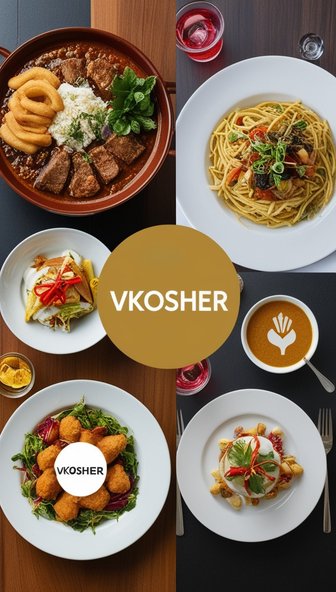Understanding Kosher Cutting Boards: A Comprehensive Guide
Kosher cutting boards are an essential component in any kitchen that adheres to Jewish dietary laws, known as kashrut. The significance of these cutting boards extends far beyond their function as a simple kitchen tool. They are integral to maintaining the sanctity and separation of different food types, particularly meat and dairy, which is a cornerstone of kosher cooking. In this comprehensive guide, we will delve into the various aspects of kosher cutting boards, from their religious importance to the practical considerations of using and maintaining them.
The Importance of Kosher Cutting Boards
In a kosher kitchen, the separation of meat and dairy is paramount. This separation is based on a verse from the Torah, which prohibits the cooking of a kid (young goat) in its mother’s milk. Over time, this prohibition has been expanded to include the separation of all meat and dairy products, not just in cooking but also in preparation, serving, and consumption. Cutting boards play a crucial role in this separation because they come into direct contact with food. Therefore, having separate cutting boards for meat and dairy is a fundamental requirement in maintaining a kosher kitchen.
The use of separate cutting boards helps prevent cross-contamination, which could lead to the mixing of meat and dairy in even the smallest amounts. In kosher law, even a tiny amount of one type of food residue can render the other food non-kosher if mixed. Therefore, the integrity of cutting boards is of utmost importance in a kosher kitchen.
Types of Kosher Cutting Boards
Kosher cutting boards come in various materials, each with its own set of advantages and disadvantages. The most common materials include wood, plastic, and glass. Each of these materials must be chosen and maintained carefully to ensure they remain kosher.
Wooden Cutting Boards
Wood is a traditional material for cutting boards and is often preferred in kosher kitchens. Wood has natural antimicrobial properties, which makes it a hygienic option. However, wood is also porous, which means it can absorb food juices, potentially leading to contamination. To mitigate this, wooden cutting boards used in kosher kitchens are often treated with kosher salt or sandpaper to remove any absorbed material.
Plastic Cutting Boards
Plastic cutting boards are popular in many kitchens due to their durability and ease of cleaning. They are non-porous, which reduces the risk of food residue being absorbed. However, plastic boards can develop deep cuts over time, which can trap food particles and bacteria. In a kosher kitchen, these deep cuts must be monitored closely, and the boards replaced regularly to prevent contamination.
Glass Cutting Boards
Glass cutting boards are the least porous of all, making them an excellent choice for kosher kitchens. They do not absorb any food particles and are easy to clean. However, glass cutting boards can be slippery and may dull knives quickly. Despite these drawbacks, their non-porous nature makes them highly suitable for kosher use.
Koshering Cutting Boards
Koshering, or the process of making something kosher, applies to cutting boards as well. If a cutting board has been used with non-kosher food or has been accidentally used for both meat and dairy, it may be possible to kosher it, depending on the material. The koshering process typically involves thoroughly cleaning the cutting board, followed by pouring boiling water over it or using a blowtorch to heat the surface, depending on the material.
For wooden and plastic boards, the process may involve scrubbing the board with hot, soapy water, rinsing it thoroughly, and then pouring boiling water over the surface. In some cases, rabbis may recommend leaving the board unused for a specific period before koshering it. Glass cutting boards, being non-porous, can usually be koshered more easily, typically with just a thorough cleaning and boiling water.
Maintaining Kosher Cutting Boards
Maintaining the kosher status of cutting boards requires vigilance and care. Each cutting board should be clearly designated for either meat or dairy, and this designation must be strictly adhered to. Some kosher kitchens go a step further by color-coding their cutting boards to avoid any confusion. For example, red boards might be used exclusively for meat, while blue boards are for dairy.
Regular cleaning is essential to maintaining the kosher status of cutting boards. After each use, the board should be washed thoroughly with hot, soapy water. If the board comes into contact with non-kosher food or if it is used for the wrong type of food (e.g., a meat board used for dairy), it may need to be koshered again, depending on the severity of the contamination.
It is also important to inspect cutting boards regularly for any signs of wear and tear. Deep cuts, scratches, or grooves in the board can harbor food particles and bacteria, making it difficult to keep the board kosher. When a cutting board becomes too worn, it should be replaced to maintain the highest standards of kashrut.
The Role of Rabbinic Guidance
In a kosher kitchen, the guidance of a rabbi is often sought to ensure that all utensils, including cutting boards, adhere to the stringent requirements of kashrut. Rabbis can provide advice on the best practices for maintaining kosher cutting boards, as well as the proper methods for koshering them if they become contaminated.
For those who are new to keeping kosher, rabbinic guidance is especially important. Understanding the nuances of kashrut can be challenging, and a rabbi can help navigate these complexities, ensuring that the kitchen remains kosher and that all food prepared is suitable for consumption according to Jewish dietary laws.
Innovations in Kosher Cutting Boards
The market for kosher kitchen products has expanded in recent years, with manufacturers creating cutting boards specifically designed for kosher kitchens. These innovations include cutting boards with built-in antimicrobial properties, boards that are dishwasher safe, and boards made from new materials that are both durable and easy to kosher.
Some companies have also introduced cutting boards with clear labeling systems, making it easier to distinguish between meat and dairy boards. These boards often come with symbols or text embedded in the surface, indicating their designated use. This helps prevent accidental cross-contamination and ensures that the kitchen remains kosher at all times.
Kosher Cutting Boards in Commercial Kitchens
In commercial kitchens that operate under kosher supervision, the use of kosher cutting boards is even more critical. These kitchens often have multiple stations for meat and dairy preparation, each equipped with its own set of cutting boards. The strict separation of these stations is enforced by kosher supervisors, who regularly inspect the kitchen to ensure compliance with kashrut.
In addition to regular cleaning and koshering, commercial kosher kitchens may also implement strict protocols for the use and storage of cutting boards. For example, cutting boards may be stored in separate cabinets or on separate shelves, clearly marked for meat or dairy use. These protocols help maintain the integrity of the kitchen and ensure that all food prepared is kosher.
Conclusion
Kosher cutting boards are more than just a kitchen tool; they are a vital part of maintaining a kosher kitchen. From the choice of material to the methods of cleaning and koshering, every aspect of using a kosher cutting board is guided by the principles of kashrut. Whether in a home kitchen or a commercial setting, the careful management of cutting boards is essential to preserving the sanctity and purity of kosher food preparation. With proper care, attention, and guidance, kosher cutting boards can serve as a reliable foundation for a kitchen that upholds the highest standards of Jewish dietary law.




